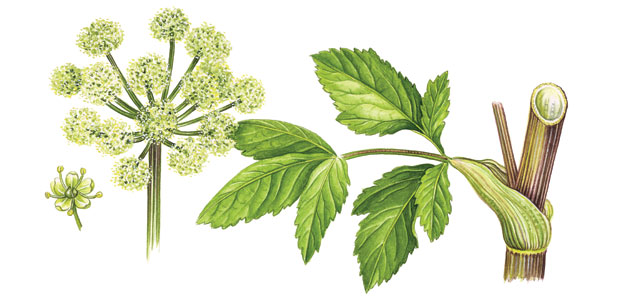Advertisement
Dong Quai
A great team player

Some herbs are so complex that they have the ability to heal many different diseases and health problems. Dong quai (Angelica sinensis) is one such herb.
Dong quai is a hard-working team player, found in combination with other herbs, depending on the health disorder to be treated. When combined with black cohosh and chasteberry, dong quai is an effective treatment for female health disorders. It is also found in formulas with cascara sagrada, capsicum, and ginger to calm stomach contractions, aid digestion, and alleviate flatulence, and in other formulas to treat circulatory and liver conditions. The list goes on, as dong quai is effective for conditions ranging from constipation to rheumatoid arthritis.
The Female Ginseng
For thousands of years practitioners of traditional Chinese medicine have used dong quai to treat problems related to disorders of the female reproductive system. Often referred to as the “female ginseng,” dong quai has a well-earned reputation as a female tonic.
Historically, practitioners of Chinese medicine found that dong quai balances the female hormone system, especially during the declining hormone levels of menopause. Dong quai has the reputation of acting as a catalyst in the production of progesterone, a hormone essential in the production of vaginal tissues and secretions.
Studies at the University of Pittsburgh School of Medicine by Dr. Patricia Eagon show that dong quai binds to estrogen receptors. However, analysis of dong quai identifies that it contains no estrogen constituents. Instead, the beneficial effects of this herb appear to come from dong quai’s soothing antispasmodic action.
Menstruation and Menopause
Premenstrual syndrome (PMS) symptoms such as cramps respond well to the calming effect of this herb. Dong quai is a mainstay treatment for menstruation and menopause disorders in traditional Chinese medicine.
Herbal alternatives that include dong quai in their formulas may relieve night sweats, mood swings, hot flashes, bloating, and heavy bleeding.
Dong quai also offers an alternative to risky hormone replacement therapy (HRT) treatments, which have been under scrutiny in recent years.
Circulatory and Liver Conditions
Dong quai is included in combinations for circulatory and liver conditions due to its ability to reduce the viscosity of blood. The antispasmodic and soothing effects of dong quai have made it the herb of choice in treating conditions such as hypertension and high blood pressure. By soothing the arteries and calming the vascular system, it lowers stress on the heart.
Blood Thinner
Dong quai is not recommended for pregnant or nursing mothers due to the effect it has on the female hormone system. Side effects of dong quai include diarrhea, stomach upset, and early onset of menstruation. Fair-skinned people may notice an increased sensitivity to sunlight.
Dong quai should not be taken in conjunction with blood thinners such as warfarin as dong quai contains coumarin–an anticoagulant–that prevents the action of vitamin K, the blood-clotting vitamin.
Due to the complex dosage requirements, take dong quai only under the guidance of a clinical herbalist.
At the Root of Dong Quai
Active constituents in dong quai include vitamins A, B12, and E, as well as numerous phytochemicals and minerals, including calcium and magnesium. Dong quai contains active coumarin compounds such as psoralen, bergapten, angelicone, and osthole (regarded as a brain stimulant, possibly due to its ability to increase blood flow).
In traditional Chinese medicine, the beneficial effects of dong quai are extracted from the raw root, by boiling it in water or soaking it in wine. Dong quai tablets, teas, tinctures, and capsules generally offer a standard dosage, important for effective treatment.
A Herb by any Other Name
Dong quai is a plant from the Umbelliferae family that is native to China, Japan, and Korea. The herb thrives in ravines and damp riverbanks, growing to a height of 3 to 6 feet (1 to 2 metres). In June it bears white flowers, and in the fall, a seeded fruit.
The name Dong quai translates as “return to order.” Common or local names include dang quai (Chinese), tang kuei (Korean), and Chinese angelica (the plant’s common name in English).




